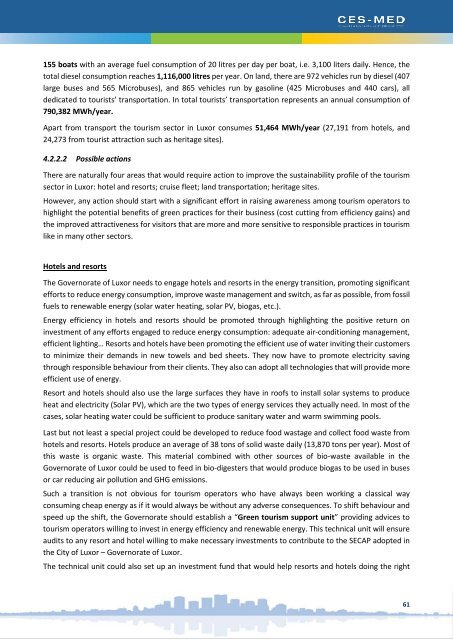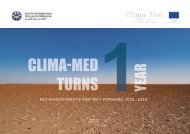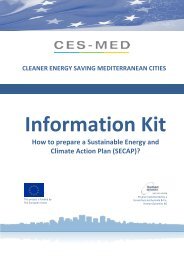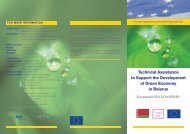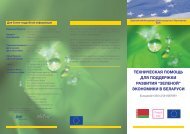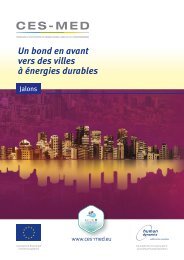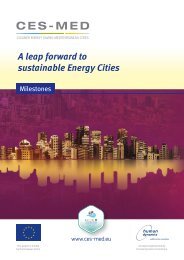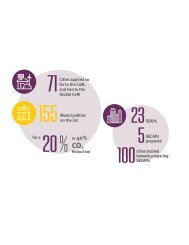280218_Luxor-Egypt SECAP Final_revised
Create successful ePaper yourself
Turn your PDF publications into a flip-book with our unique Google optimized e-Paper software.
155 boats with an average fuel consumption of 20 litres per day per boat, i.e. 3,100 liters daily. Hence, the<br />
total diesel consumption reaches 1,116,000 litres per year. On land, there are 972 vehicles run by diesel (407<br />
large buses and 565 Microbuses), and 865 vehicles run by gasoline (425 Microbuses and 440 cars), all<br />
dedicated to tourists’ transportation. In total tourists’ transportation represents an annual consumption of<br />
790,382 MWh/year.<br />
Apart from transport the tourism sector in <strong>Luxor</strong> consumes 51,464 MWh/year (27,191 from hotels, and<br />
24,273 from tourist attraction such as heritage sites).<br />
4.2.2.2 Possible actions<br />
There are naturally four areas that would require action to improve the sustainability profile of the tourism<br />
sector in <strong>Luxor</strong>: hotel and resorts; cruise fleet; land transportation; heritage sites.<br />
However, any action should start with a significant effort in raising awareness among tourism operators to<br />
highlight the potential benefits of green practices for their business (cost cutting from efficiency gains) and<br />
the improved attractiveness for visitors that are more and more sensitive to responsible practices in tourism<br />
like in many other sectors.<br />
Hotels and resorts<br />
The Governorate of <strong>Luxor</strong> needs to engage hotels and resorts in the energy transition, promoting significant<br />
efforts to reduce energy consumption, improve waste management and switch, as far as possible, from fossil<br />
fuels to renewable energy (solar water heating, solar PV, biogas, etc.).<br />
Energy efficiency in hotels and resorts should be promoted through highlighting the positive return on<br />
investment of any efforts engaged to reduce energy consumption: adequate air-conditioning management,<br />
efficient lighting… Resorts and hotels have been promoting the efficient use of water inviting their customers<br />
to minimize their demands in new towels and bed sheets. They now have to promote electricity saving<br />
through responsible behaviour from their clients. They also can adopt all technologies that will provide more<br />
efficient use of energy.<br />
Resort and hotels should also use the large surfaces they have in roofs to install solar systems to produce<br />
heat and electricity (Solar PV), which are the two types of energy services they actually need. In most of the<br />
cases, solar heating water could be sufficient to produce sanitary water and warm swimming pools.<br />
Last but not least a special project could be developed to reduce food wastage and collect food waste from<br />
hotels and resorts. Hotels produce an average of 38 tons of solid waste daily (13,870 tons per year). Most of<br />
this waste is organic waste. This material combined with other sources of bio-waste available in the<br />
Governorate of <strong>Luxor</strong> could be used to feed in bio-digesters that would produce biogas to be used in buses<br />
or car reducing air pollution and GHG emissions.<br />
Such a transition is not obvious for tourism operators who have always been working a classical way<br />
consuming cheap energy as if it would always be without any adverse consequences. To shift behaviour and<br />
speed up the shift, the Governorate should establish a “Green tourism support unit” providing advices to<br />
tourism operators willing to invest in energy efficiency and renewable energy. This technical unit will ensure<br />
audits to any resort and hotel willing to make necessary investments to contribute to the <strong>SECAP</strong> adopted in<br />
the City of <strong>Luxor</strong> – Governorate of <strong>Luxor</strong>.<br />
The technical unit could also set up an investment fund that would help resorts and hotels doing the right<br />
61


